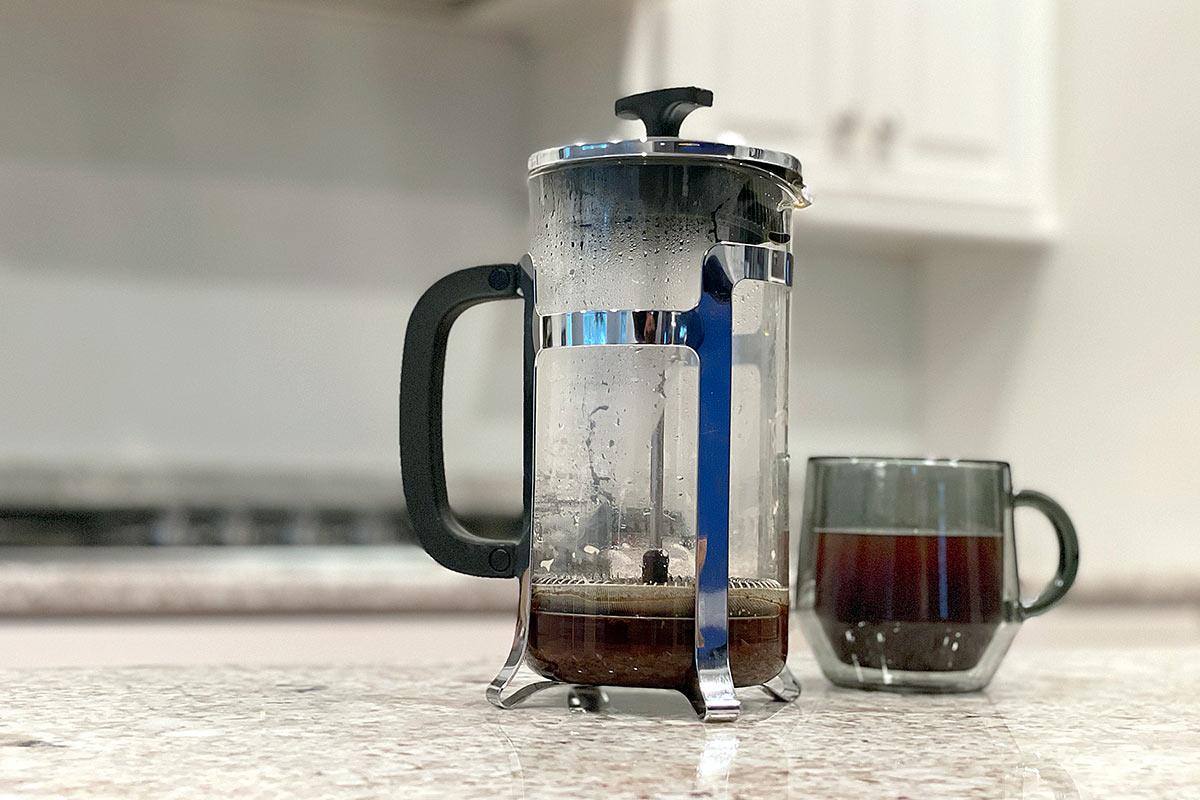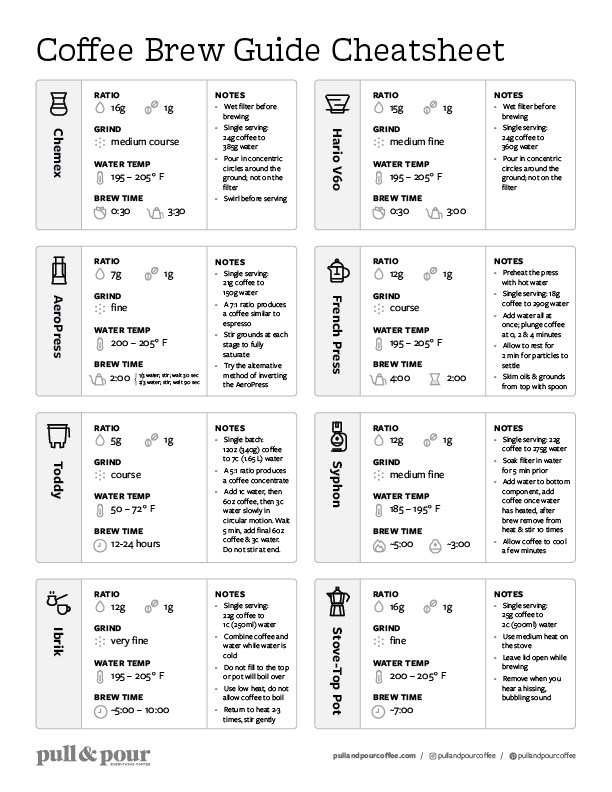The French Press is clearly one of the most popular pieces of coffee brewing equipment around. But why is that? What are the advantages? And how do you make really good French Press coffee?
This guide contains all of the answers to those questions, along with some unusual uses for your French Press that you may not even have thought of. Let’s take a look at why the French Press is one of the best brewing methods around.
The Advantages of French Press Coffee
There are several advantages to French Press coffee when compared to other brewing methods:
- It’s cost-effective to buy. A French Press is considerably less expensive than other coffee brewers.
- You have more control over the taste. You control the brewing time and water temperature (as you would with a gooseneck kettle). Therefore, you can play with these variables easily to achieve your preferred taste.
- The flavor is deeper. When you use a paper filter with other brewing methods, some of the oils inside the coffee bean are trapped in the filter. The coffee bean oils are what give the coffee its rich taste – so the more of those oils in your brew, the deeper the flavor you’ll achieve.
- It’s great for traveling. You can take your French Press with you anywhere, as it’s light and easy to use. Hot water, coffee grounds, and you’re all set.
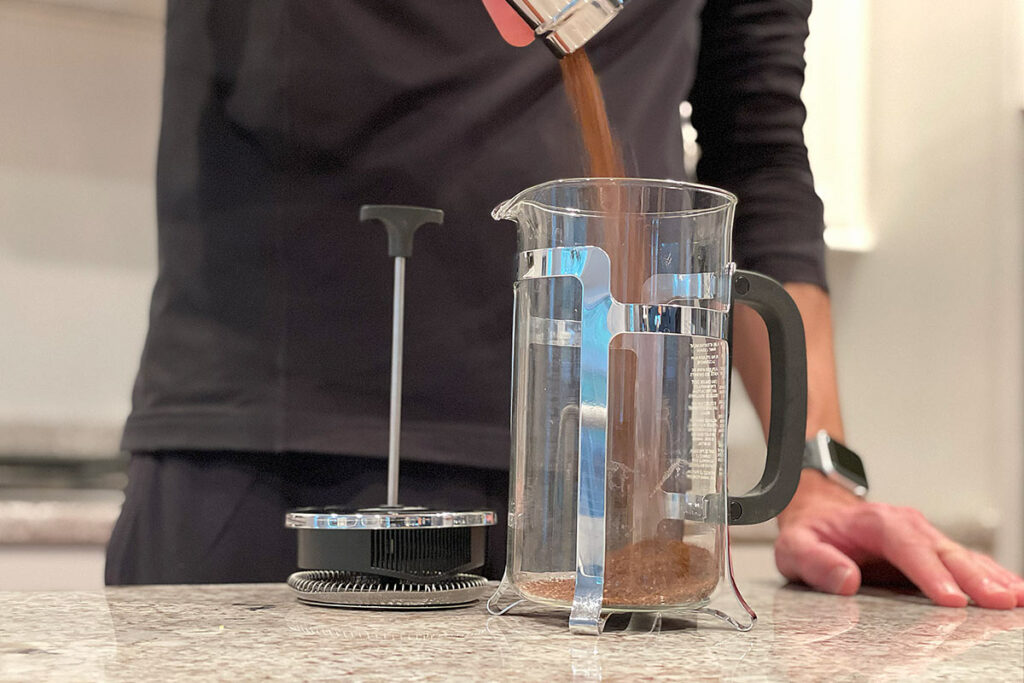
How to Brew Excellent French Press Coffee
Time needed: 5 minutes
How to brew French Press coffee in less than five minutes
- Preheat your French Press
Preheat brewer and the plunger with hot water while you grind your coffee (for about 30 seconds). Pour out the hot water.
- Grind your coffee coarsely
Add your ground coffee to the French Press (making sure the grounds are evenly distributed).
- Pour half of your water over coffee grounds
Pour half of your total hot water (200° F / 93.3° C) in a circular motion over the grounds and ensure that all the grounds are submerged.
- Let your coffee bloom
Let the coffee rest in the water for about 30 seconds.
- Slowly add remaining water
Add the rest of the water into the French Press. Put on the lid and slowly lower the plunger until the mesh only just touches the surface of the water.
- Brew coffee
Set a timer to 4 minutes to allow your coffee to brew.
- Filter the coffee
Bring the plunger down slowly. Immediately decant your coffee into another container so that it doesn’t brew too long (it will get over extracted and taste bitter).
Troubleshooting Guide
If your coffee doesn’t taste as it should, here are some possible reasons why:
- Water quality. If your water doesn’t taste good on its own, it won’t taste good in your coffee. Use the purest water you can get or use Third Wave Water or another product to help optimize your water for coffee.
- Brewing temperature. Make sure your water temperature is within the 195° F to 205° F (90.6° C to 96° C) range. Water that is not hot enough will not extract the coffee properly. If you don’t have a thermometer, you can still reach the ideal water temperature by boiling your water and letting it sit for 30 seconds. At ~30 seconds off boil, it should be the perfect temperature for brewing.
- Grind size. You’ll want a coarser grind for your French Press than for a drip coffee maker. Fine grinds make for bitter-tasting coffee, and too coarse grinds make for weak coffee. Either grind it yourself or use a local coffee grinder and tell your brewing with a French Press. For best results, get a high-quality burr grinder—nothing beats freshly ground coffee.
- Master the slow press. For a cleaner cup of coffee (without too much sediment), take 30 seconds to press down on the plunge—yes, that’s how slow you’ll want to go.
- Get the dosage right. A basic rule of thumb is to use one rounded tablespoon of ground coffee for each 4-ounce cup. You can then adjust up or down to your liking. You should always use a scale for the most accurate results though.
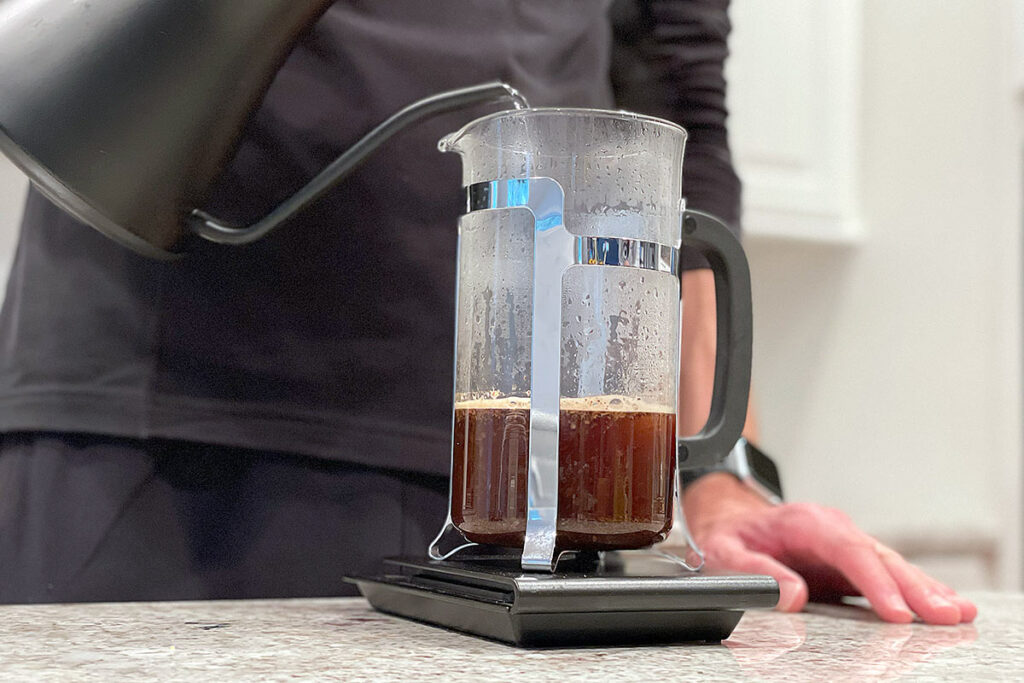
Other Uses for Your French Press
The French Press can be used for more than just making coffee too. Here are some uses for your French Press that you might not have thought of:
- Rehydrate dried foods
- Juice berries
- Mix drinks
- Rinse grains
Questions About French Press Coffee
The first official patent for the French Press belonged to Italians, Attilio Calimani and Giulio Moneta, in 1929. That said, the earliest legend around the French Press is French. A Frenchman was preparing his daily coffee in the 1850s. While boiling the water for his coffee, he realized he’d forgotten to put in the coffee. Once he added the coffee grounds, they rose to the surface of the water and he wanted to save the grounds for later. He fitted a metal screen over the pot and used a stick to press down on the grounds. When he discovered how good the resulting coffee tasted, the rest, as they say, is history.
It may be more time-consuming to use a French Press, but yes, it is definitely worth the effort compared to a standard drip machine!
When you see a “4 cup French Press,” don’t be fooled into thinking it will make you three cups of coffee. The cup size is based on smaller European cups (4 ounces), not on our American mug-sized coffees (8 to 10 ounces).
Here are some rough guidelines:
– A 3 cup French Press will yield about 12 ounces of coffee, which serves one mug with a bit leftover.
– An 8 cup French Press will make 34 ounces, which can fill up 3 mugs.
– A 12 cup French Press will make 51 ounces or about 5 mugs.
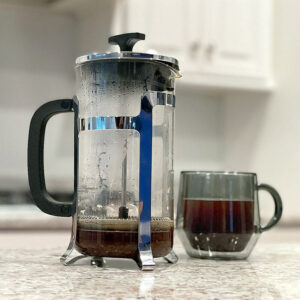
Easy French Press Recipe
Equipment
- French Press coffee brewer
Ingredients
- 32 g coffee ground coarsely
- 400 g hot water 200° F (93.3° C)
Instructions
- Preheat your French Press with hot water (for about 30 seconds). Dump out the hot water.
- Coarsely grind 32 grams of coffee and add it to the French Press making sure the grounds are evenly distributed
- Pour 200g of 200° F water (93.3° C) in a circular motion over the grounds and ensure that all the grounds are submerged.
- Let your coffee bloom (rest in the water) for about 30 seconds.
- Add remaining 200g of the water into the French Press.
- Put on the lid and slowly lower the plunger until the mesh only just touches the surface of the water.
- Set a timer to 4 minutes to allow your coffee to brew.
- Bring the plunger down slowly over 30 seconds.
- Immediately pour your coffee into a mug or other container so that it does not brew too long and get over-extracted (making it taste bitter).
